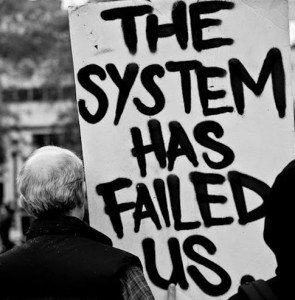
Speaking of the United States, unfortunately, one must note that today the dominant mood in the American society today is heavy frustration that is gradually transforming into open outrage. The Washington Post along with other media sources have recently published a series of articles that describe the discontent that Americans have with the Wall Street, Muslims, trade agreements, Washington, police shootings, President Barack Obama, Republicans, migrants, and other issues.
It is true that a significant number of Americans are now living longer, but they are unhappy, since they are unable to save enough money to guarantee them a decent pension, that would allow them to enjoy a comfortable retirement. And this is happening against the background of Americans being forced to pay more for health insurance because of the reforms carried out by the Obama administration.
The growing social and racial inequality makes people mad, but what is even worse is that there’s no real way for even the most hard working people to change their position in the society, which means that the so-called “American Dream” is literally dead. And that’s something most Americans simply unable to take lightly. The disillusionment in liberal values transforms in a global trend they call “democratic deconsolidation” – meaning a growing lack of faith in democracy.
The The New York Times would note that earlier generations that had a stronger faith in democracy grew up in a period in which there were large-scale systematic alternatives to democracy (in the form of fascism and communism) that America defined itself against. As such alternatives were defeated or retreated from the world stage, the salience of democracy as a defining feature of a polity became less important.
In turn, the CBS News says that a handful of industries are those “love to hate” types of businesses, such as cable-television companies and Internet service providers. The federal government has joined the ranks of the bottom-of-the-barrel industries, according to a new survey from the American Customer Satisfaction Index. Americans’ satisfaction level in dealing with federal agencies –everything from Treasury to Homeland Security — has fallen for a third consecutive year, reaching an eight-year low.
It is now clear that dissatisfaction with government edged out the economy as the problem more Americans perceive as the nation’s top problem. The recent Gallup research shows that Americans mentioned some aspect of government, including President Barack Obama, Congress or political conflict, as the country’s chief problem. The economy came in second with 13% mentioning it, while unemployment and immigration tied for third at 8%. It’s been reported that three in four Americans (75%) last year perceived corruption as widespread in the country’s government. What’s even more depressing is that the percentage of US adults who see corruption as pervasive has never been less than a majority in the past decade.
Yet another research conducted by Gallup would make it clear that for the seventh year in a row, less than 20% of Americans approved of the job that Congress is doing. In 2016, approval averaged 17% for the year, only slightly better than the all-time low average of 14% in 2013.
Americans have given Congress low approval ratings throughout the decade, possibly owing to the hyperpartisanship.This could be related to Americans’ frustration with the seeming inability of Congress to get important things done, and their frequent selection of the government as the nation’s most important problem. But at the same time the poll shows that Americans who are the most negative about Congress are not making their judgment based on a vague sense of what is happening in Washington, but most likely basing their opinions on a well-informed view of the institution and its operations.
The fact that Washington has been ignoring such sentiments for over a decade resulted in the split within both the Democratic and Republican parties, making it impossible to form any sort of coalition that is a must for any government that wants to have any chances at governing the country, which will result in some major problems that the new president is about to face in his first term in office.
Grete Mautner is an indepenent researcher and journalist from Germany, exclusively for the online magazine “New Eastern Outlook.”